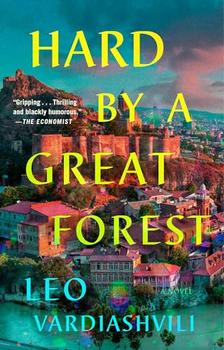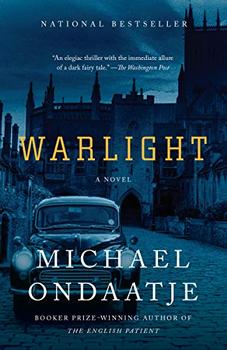Summary | Excerpt | Reading Guide | Reviews | Beyond the book | Read-Alikes | Genres & Themes | Author Bio

A Novel
by Leo VardiashviliWhen civil war breaks out in Georgia shortly after its secession from the Soviet Union in 1991, Saba, the protagonist and first-person narrator of Hard by a Great Forest, flees to the safety of London with his father and older brother, Sandro. His mother, unable to secure a passport, is forced to stay behind in the rapidly escalating chaos of their home city of Tbilisi.
Almost two decades later, Saba is now in his late twenties, his mother has died without ever managing to reunite with her sons, and his father has returned to Georgia to make peace with the past—only to disappear under mysterious circumstances. When Sandro also vanishes while searching for their missing father, Saba sets off on a frantic quest across Georgia to track them down, following a trail of cryptic clues his brother has scattered for him—like the breadcrumbs left by Hansel and Gretel in the classic fairy tale, from whose opening lines the book takes its title.
Saba's mission to find his missing father and brother forms the book's central plotline, a high-octane race to chase them down while eluding a sinister police detective hot on his heels. Along the way, Saba teams up with Nodar, a chain-smoking, vodka-swilling taxi driver who takes the young man under his wing and chauffeurs him around the country in his battered tin can of a car. Nodar plays the role of the comic sidekick, his acerbic wit and penchant for cursing in colorful terms injecting levity into the book even as it wades into emotionally difficult territory. But Nodar has his own tragic backstory, too. In exile from South Ossetia, a conflict-ridden breakaway region of Georgia, Nodar is searching for a lost daughter, and as their stories intersect, Saba and Nodar find themselves veering deeper into danger.
At times, elements of the plot feel slightly contrived, as does the premise of having the mystery unfold through a scavenger hunt of clues. However, this device also becomes the vehicle for developing the book's other main storyline—Saba's return to the lost country of his birth. As he revisits the half-remembered places of his childhood in search of clues, Saba is forced to confront unsettling ghosts from his past—suppressed traumas from a life of displacement, haunting memories of people left behind. (Not always to successful effect, Vardiashvili has these ghosts literally haunt Saba, visiting him as voices in his head with whom he has extended conversations.) His hunt for his missing father becomes an odyssey to rediscover the homeland from which he was uprooted.
Like his protagonist, Vardiashvili escaped to London as a refugee from his native Tbilisi at a young age, visiting again for the first time only after a long absence, and he excels at capturing the disorienting experience of returning to a homeland where you are no longer at home. Stopping at an ATM, Saba insists on not changing the language to English, then cringes in embarrassment at the line of customers waiting impatiently as he bumblingly mouths out the Georgian words on the screen. Driving through the streets of Tbilisi, he experiences a bewildering mix of the familiar and the unfamiliar, a landscape of fragmentary memories that dissolve and fracture into the unrecognizable. "I began to recognize things—a crumbling street corner, or a building, or a peculiar twist of the road," Saba remarks. "At the same time, I didn't recognize a damn thing."
In a prefatory letter to the reader, Vardiashvili notes that one goal of the book is to shed light on the "elusive heartache" of every refugee's experience—the trauma of being uprooted, the bitter grief of leaving loved ones behind, the pain of returning as a stranger. "But I also wanted to show you the culture and spirit of the Georgian people," he writes. "Centuries of trouble have done nothing but make it more welcoming, bighearted, and able to face down any adversity with humor."
Vardiashvili doesn't always accomplish that with subtlety. Perhaps one too many characters repeats the mantra "A guest is a gift from God" (as if the reader might otherwise fail to notice their hospitable nature). Vardiashvili shines, however, when he lets his characters' good-humored resilience speak for itself, and he's stocked the novel with a full cast of endearing, big-hearted characters—from central figures like Nodar to bit players like the wizened old lady who leads Saba up a teetering wooden staircase to share a humble meal. "I looked in here the other day and found the cockroach had hung himself," she quips when she notices Saba staring at the bare shelves of her empty fridge.
Hard by a Great Forest deals with dark themes: war, displacement, loss and grief. But although it includes more than a few harrowing scenes, the book is also funny, touching and infused with quirky charm. Frequent allusions to fairy tales—from the Brothers Grimm to The Wizard of Oz—weave throughout the book. And indeed, with its touches of the surreal (including escaped zoo animals prowling the streets of Tbilisi) and elements that evoke a fairy tale setting (including a danger-ridden forest where fireflies glow like magical lights), the book reads a bit like a fairy tale itself, a coming-of-age story in which the hero, much like Hansel and Gretel, must undertake a journey of perils before he can make it back home—wiser and stronger. "They say you can never go home again," Saba muses toward the end of the book. "But what if you can? What if you should? What if no matter what you do with your life, you'll somehow always end up in that place you didn't want to leave?"
![]() This review was originally published in The BookBrowse Review in February 2024, and has been updated for the
January 2025 edition.
Click here to go to this issue.
This review was originally published in The BookBrowse Review in February 2024, and has been updated for the
January 2025 edition.
Click here to go to this issue.

If you liked Hard by a Great Forest, try these:

by Julia Phillips
Published 2020
Spellbinding, moving - evoking a fascinating region on the other side of the world - this suspenseful and haunting story announces the debut of a profoundly gifted writer.

by Michael Ondaatje
Published 2019
A mesmerizing new novel that tells a dramatic story set in the decade after World War II through the lives of a small group of unexpected characters and two teenagers whose lives are indelibly shaped by their unwitting involvement.
Your guide toexceptional books
BookBrowse seeks out and recommends the best in contemporary fiction and nonfiction—books that not only engage and entertain but also deepen our understanding of ourselves and the world around us.